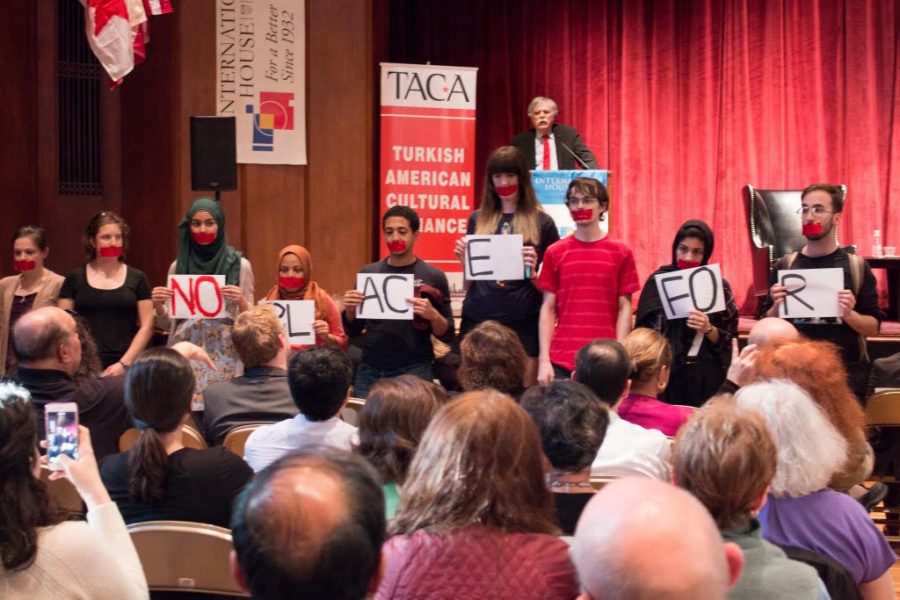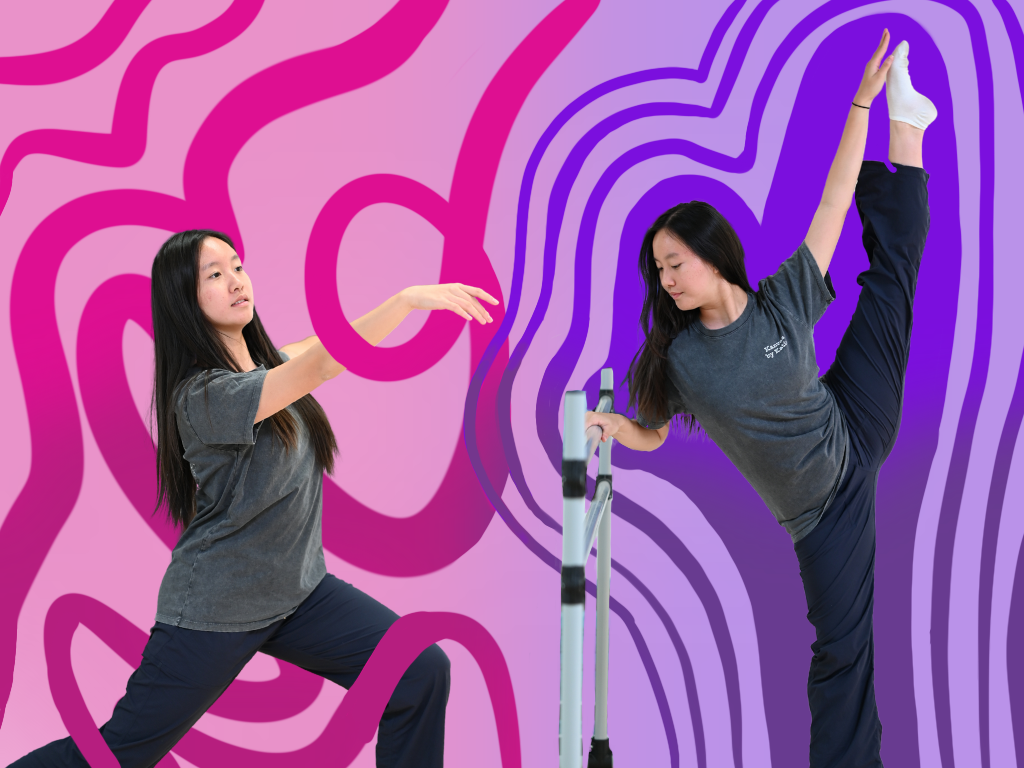Loss of safe spaces and trigger warnings ceases to encourage free speech and diversity
provided by Zoe Kaiser
Students protested during genocide denier Justin McCarthy’s talk titled “Turks and Armenians: Nationalism and Conflict in the Ottoman Empire at the University of Chicago in April. The University of Chicago has struggled with issues concerning free speech and academic freedom, leading dean of students to state in his letter that safe spaces and trigger warnings will not be used in the following school year.
September 7, 2016
In a welcome letter addressed to the University of Chicago’s class of 2020, Dean of Students Jay Ellison stated that “trigger warnings” and “safe spaces” will no longer be utilized in the university community.
The University of Chicago advocates for the idea that members of their community can “speak, write, listen, challenge and learn, without fear of censorship,” and that they can “expect members of [their] community to be engaged in rigorous debate, discussion, and even disagreement. At times this may challenge [students] and even cause discomfort,” as said in the letter.
Actions taken by the University of Chicago allegedly promotes a greater sense of free speech without the fear of censorship and will create a community containing varied and contrasting backgrounds and opinions.
Safe spaces gave students an opportunity to discuss sensitive topics with individuals in similar situations in their academic lives or to avoid classes covering delicate subjects. They provided a platform for students in need to connect with others and share experiences; these groups can discuss subjects ranging from religion to sexual identification to race. However, safe spaces do not shelter, but equip individuals with a community serving as a safety net that comprehends difficulties others may not.
Similarly, professors and other faculty members frequently posted trigger warnings prior to lectures covering difficult topics. The absence of trigger warnings means more forced class participation within the student body as well as not cancelling controversial speakers. For instance, last year, DePaul University, located in neighborhood of University of Chicago, cancelled Ben Shapiro talk after protests had broken out against his conservative views.
The letter promotes the concept that “fostering the free exchange of ideas reinforces a related University priority – building a campus that welcomes people of all backgrounds,” and that “the members of our community must have the freedom to espouse and explore a wide range of ideas.”
While diversity may be achieved to an extent, if an educational institution wants to foster a variety of perspectives, individuals require a comfortable and supportive environment.
As an example, if the University of Chicago encourages students struggling with gender identity or sexual orientation to attend classes dealing with backlash on issues relating to these, some individuals will only feel safe knowing they have a community based on similar matters in question to rely on.
The university emphasizes the exchange of freely-flowing ideas in its environment; however, the nature of sensitivity obstructs this ideal as with the absence of individuals connected to a difficult topic, students discussing it will be able to convey ideas freely, without the burden of possibly offending others. However, conversation outside a safe space between a diversified group of individuals suppresses certain perspectives, due to the risk of upsetting other members of the community.
These recent changes will serve as an example of the struggle for speech freedom and academic equality in the present and precedent in the future to the world outside of the University of Chicago. In light of equality in the 21st century, University of Chicago should have kept these safe spaces and trigger warnings to halt the increase in problems of speech and academic freedom as well as the ever increasing gap between the homogenic majority and the minority beliefs, ideals, and systems.
While the University of Chicago struggles with creating equality within their academic environment, communities worldwide should not only support the affected students in University of Chicago but also protect the minorities and vouch for equality in our own society.


















![“[Building nerf blasters] became this outlet of creativity for me that hasn't been matched by anything else. The process [of] making a build complete to your desire is such a painstakingly difficult process, but I've had to learn from [the skills needed from] soldering to proper painting. There's so many different options for everything, if you think about it, it exists. The best part is [that] if it doesn't exist, you can build it yourself," Ishaan Parate said.](https://harkeraquila.com/wp-content/uploads/2022/08/DSC_8149-900x604.jpg)




![“When I came into high school, I was ready to be a follower. But DECA was a game changer for me. It helped me overcome my fear of public speaking, and it's played such a major role in who I've become today. To be able to successfully lead a chapter of 150 students, an officer team and be one of the upperclassmen I once really admired is something I'm [really] proud of,” Anvitha Tummala ('21) said.](https://harkeraquila.com/wp-content/uploads/2021/07/Screen-Shot-2021-07-25-at-9.50.05-AM-900x594.png)







![“I think getting up in the morning and having a sense of purpose [is exciting]. I think without a certain amount of drive, life is kind of obsolete and mundane, and I think having that every single day is what makes each day unique and kind of makes life exciting,” Neymika Jain (12) said.](https://harkeraquila.com/wp-content/uploads/2017/06/Screen-Shot-2017-06-03-at-4.54.16-PM.png)








![“My slogan is ‘slow feet, don’t eat, and I’m hungry.’ You need to run fast to get where you are–you aren't going to get those championships if you aren't fast,” Angel Cervantes (12) said. “I want to do well in school on my tests and in track and win championships for my team. I live by that, [and] I can do that anywhere: in the classroom or on the field.”](https://harkeraquila.com/wp-content/uploads/2018/06/DSC5146-900x601.jpg)
![“[Volleyball has] taught me how to fall correctly, and another thing it taught is that you don’t have to be the best at something to be good at it. If you just hit the ball in a smart way, then it still scores points and you’re good at it. You could be a background player and still make a much bigger impact on the team than you would think,” Anya Gert (’20) said.](https://harkeraquila.com/wp-content/uploads/2020/06/AnnaGert_JinTuan_HoHPhotoEdited-600x900.jpeg)

![“I'm not nearly there yet, but [my confidence has] definitely been getting better since I was pretty shy and timid coming into Harker my freshman year. I know that there's a lot of people that are really confident in what they do, and I really admire them. Everyone's so driven and that has really pushed me to kind of try to find my own place in high school and be more confident,” Alyssa Huang (’20) said.](https://harkeraquila.com/wp-content/uploads/2020/06/AlyssaHuang_EmilyChen_HoHPhoto-900x749.jpeg)










